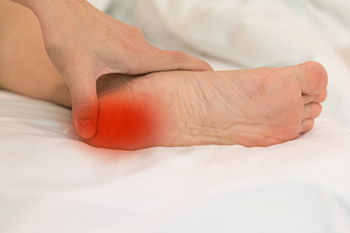What Is Heel Fat Pad Syndrome?
Tuesday, 26 October 2021 00:00The heels of our feet are cushioned by fatty tissues that form a heel pad. This structure acts as a shock absorber, protecting our heel bones from injury. Acute or chronic trauma to the foot and aging can both wear away the heel pad, causing deep, bruise-like pain. People who are older or obese, and those who have rheumatoid arthritis or receive corticosteroid injections into the feet are at an increased risk of developing this condition. Treatment for heel fat pad syndrome is typically conservative and involves resting and icing the affected foot, wearing more comfortable shoes or orthotics, and taking non-steroidal anti-inflammatory drugs to reduce pain. If you are experiencing heel pain, it is suggested that you seek the care of a podiatrist.
Many people suffer from bouts of heel pain. For more information, contact Dr. Eugenio Rivera of Calo Foot & Ankle Specialists. Our doctor can provide the care you need to keep you pain-free and on your feet.
Causes of Heel Pain
Heel pain is often associated with plantar fasciitis. The plantar fascia is a band of tissues that extends along the bottom of the foot. A rip or tear in this ligament can cause inflammation of the tissue.
Achilles tendonitis is another cause of heel pain. Inflammation of the Achilles tendon will cause pain from fractures and muscle tearing. Lack of flexibility is also another symptom.
Heel spurs are another cause of pain. When the tissues of the plantar fascia undergo a great deal of stress, it can lead to ligament separation from the heel bone, causing heel spurs.
Why Might Heel Pain Occur?
- Wearing ill-fitting shoes
- Wearing non-supportive shoes
- Weight change
- Excessive running
Treatments
Heel pain should be treated as soon as possible for immediate results. Keeping your feet in a stress-free environment will help. If you suffer from Achilles tendonitis or plantar fasciitis, applying ice will reduce the swelling. Stretching before an exercise like running will help the muscles. Using all these tips will help make heel pain a condition of the past.
If you have any questions please contact our office located in Bellaire, TX . We offer the newest diagnostic and treatment technologies for all your foot and ankle needs.










